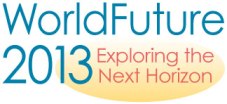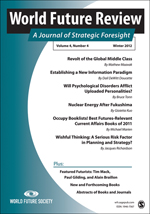SAGE Begins Publishing World Future Review
 SAGE begins publishing World Future Review
SAGE begins publishing World Future Review
Official Journal of the World Future Society
SAGE has been chosen by the World Future Society to publish its journal, the World Future Review (WFR), beginning in early 2013. The journal’s new home on the Web will be wfr.sagepub.com.
 WFR aims to further the study of future trends and better societal alternatives for researchers and practitioners alike. Its mission is to help people to live a more sustainable lifestyle by promoting research that fairly evaluates the outcomes of existing policies in multiple fields, assesses techniques for studying future issues, and allows for the exchange of futures-relevant information among different cultures.
WFR aims to further the study of future trends and better societal alternatives for researchers and practitioners alike. Its mission is to help people to live a more sustainable lifestyle by promoting research that fairly evaluates the outcomes of existing policies in multiple fields, assesses techniques for studying future issues, and allows for the exchange of futures-relevant information among different cultures.
The articles published in WFR encapsulate the research of multiple disciplines from a futures perspective including sociology, political science, economics, management, and other social sciences.
“Our goal at WFR is to pair the quality of a peer-reviewed professional journal with an innovative spirit of inquiry that will encourage qualified contributors to offer forward-looking theories and interpretations,” stated WFR Executive Editor Tim Mack. “Because we view the future as inherently unknowable in detail, we believe that every option humanity faces deserves to be considered fairly and its merits evaluated with professional care and scholarly objectivity. No topic falls entirely outside our field, and no finding logically arrived at and clearly expressed will ever be rejected out of hand as too implausible or threatening to interest WFR readers.”
“Publishing research in the political science, economics, management, and social science disciplines, World Future Review is a great fit for SAGE and will add even more depth to our journals collection,” said Bob Howard, SAGE’s executive director of US journals. “Its emphasis on future policy and societal transformation adds a unique perspective to these disciplines and is an important outlet for research that investigates how social, economic and technological developments can shape the future.”
World Future Review is now accepting manuscripts from professionals across the globe. For more information, click here.
 The World Future Society is a nonprofit educational and scientific organization in Bethesda, Maryland, U.S., founded in 1966. The Society investigates how social, economic and technological developments are shaping the future. It helps individuals, organizations, and communities observe, understand and respond to social change appropriately and investigates the benign effects of applying anticipatory thinking to society www.wfs.org.
The World Future Society is a nonprofit educational and scientific organization in Bethesda, Maryland, U.S., founded in 1966. The Society investigates how social, economic and technological developments are shaping the future. It helps individuals, organizations, and communities observe, understand and respond to social change appropriately and investigates the benign effects of applying anticipatory thinking to society www.wfs.org.
This year’s WFS conference, WorldFuture 2013: Exploring the Next Horizon, will be held July 19-21, 2013 at the Hilton Chicago
in Chicago, Illinois.
The World Future Society’s meetings are unique, excitement-packed events. Since the First General Assembly in 1971, the Society has held a variety of small and large conferences that have brought together futurists from around the world to share ideas and vital information about the trends and events that will affect the world tomorrow.
Society meetings provide an opportunity for people from many different fields to examine significant issues and discuss common problems. Each meeting has a rich variety of sessions and speakers, allowing registrants to sample a true cross-section of futures thinking. Past Society conferences have focused on topics ranging from energy, communications, and the global economy to crisis management and conflict resolution, work and careers, and education.






























































































